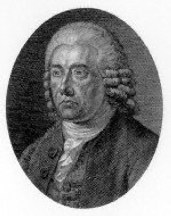Johann Salomo Semler facts for kids
Johann Salomo Semler (born December 18, 1725 – died March 14, 1791) was a German scholar. He studied the history of the church and the Bible. Semler was known for questioning old ideas about religion. Some people called him "the father of German rationalism" because he encouraged using reason and logic to understand things.
Contents
Early Life and Learning
Johann Salomo Semler was born in Saalfeld, Germany. His father was a clergyman, but the family was not rich. He grew up in a very religious home, which shaped his life.
When he was 17, Semler went to the University of Halle. There, he studied with Professor Siegmund Jakob Baumgarten, who was a well-known scholar. Semler later became Baumgarten's assistant.
In 1749, Semler worked as an editor for a newspaper in Coburg. Then, in 1751, he became a professor at the University of Altdorf. He taught about language and history. A year later, in 1752, he returned to Halle as a professor of theology, which is the study of religious faith.
Becoming a Professor
After Professor Baumgarten passed away in 1757, Semler took over as the head of the theology department at Halle. His ideas were sometimes new and caused strong reactions. However, this only made him more famous as a professor.
His popularity lasted for many years. But in 1779, he wrote a response to some controversial writings. Some people thought this meant he was changing his own views. This caused his popularity to start to fade.
Later Years and Influence
Changing Views
Even the government in Prussia showed their disapproval of Semler's response. Although Semler felt he was being consistent, his popularity began to decline. Towards the end of his life, he focused more on showing how his historical research could support traditional beliefs.
He even defended a government rule from 1788 that aimed to enforce strict Lutheranism. This was seen by some as a sign that his influence was weakening. Semler died in Halle, feeling tired and disappointed.
His Impact on Thinking
Semler's main importance was how he looked at the Bible and church history. He was not a philosopher, but he strongly believed in some important ideas. For example, he said there was a difference between personal religious beliefs and public church rules. He also pointed out that some parts of religion were local or temporary, while others were permanent.
His biggest contribution was as a critic. He was one of the first to question if all parts of the Old Testament and New Testament had the same importance. He also wondered if the traditional list of books in the Bible (the canon) was truly divine. Semler believed that revelation, or God's message, was not exactly the same as the words written in the Bible.
Semler also helped scholars understand the early Christian church. He looked at the differences between Jewish and non-Jewish groups in the early church. He also helped explore how books like the Gospels, Epistles, and Acts of the Apostles were created. He even questioned who wrote some parts of the Bible, like the Epistle to the Hebrews and the second letter of Peter. He even wanted to remove the Apocalypse from the Bible entirely.
In studying old Bible texts, Semler improved the way scholars grouped ancient manuscripts. In church history, he was a pioneer in many areas. Some scholars called him "the father of the history of doctrines" because he was the first to study this history in a truly critical way. However, everyone agrees he was just the beginning of this new approach.
His ideas about the church were different from those of another famous theologian, Friedrich Schleiermacher.
 | William M. Jackson |
 | Juan E. Gilbert |
 | Neil deGrasse Tyson |


